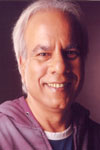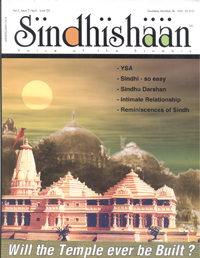Sindhi English A Saari State
By Arun Babani

When you speak to a Britisher you are ashamed of your accent, when you speak to an American you are at a loss for words, and when you speak with a Sindhi in English you smile at the ease with which he minces words; so when a Britisher will say “It’s a Plazher”, a Sindhi would call it a “Player”, When a Sindhi says “I have a Pain”, ouch, its his writing instrument he’s talking about.
English is a very versatile language, admitting all sorts of twists and turns; so where an American would order you to “wrap the doll”, a Gujarati would simply ask you to rape it, and a Sindhi would do something worse by asking for it to be rapped!
Sindhi pronunciation is funny all right, but so is Gujrati, or South Indian, Bengali or Punjabi. A Sindhi being a versatile settler, in every state he has learnt to get by with locals in their own style. So in M.P., a Sindhi would say how! how! meaning yes, in Maharashtra he would call it Acha! Acha!, meaning O.K. and in Kolkata he would use Bhalo as O.K. . To English, a Sindhi has added a little of his Sindhi masala so its Good Maarning for him, as to the gujju its good mourning! A Maharashtrian would, on the other hand make a bitch sound like beach, and turn slippers into a sleeper, our Sindhi bhau would use da in the place of Ra, so you would hear Amid-gadib in place of Amir-garib! Locals here know one or two words of Sindhis, usually to make fun like, “Wadee Saaeen’’…! Prakash will twist into Pidkaash, half fry will smell like hafeedia!, food to fudd!
Within Sindhis, different groups speak differently. Shikaarpuris have to add ‘Sha’ in place of ‘Cha’ so their six will sound like Sha, instead of the usual ‘Chha’! Same object is often referred to differently by different subgroups of Sindhis. You can immediately make out whether a Sindhi is educated or not by the use of his labels. Balcony is referred to as Angasee by the older Sindhis. There are many words in Sindhi either pronounced differently so that they sound totally dissimilar or different words all used to denote them. An educated Sindhi would see a Doctor, where the traditional Sindhi will call him Vaid or Hakim. The use of English by some Sindhis is near disaster, particularly if spoken from a dias or stage, over a microphone, then the atrocious pronunciation and use of wrong words make for ridiculous situations.
The younger English educated Sindhi speak well but that is because they have no influence of the Sindhi language upon them, in the process they cannot pronounces Sindhi words even if they speak Sindhi at home. For instance a •Bakri in Sindhi is pronounced not with •Ba, an alphabet not found in English, but •Ba. So most young people call themeselves Baar instead of •Baar.
Presently in western countries a linguistic debate is on to rewrite and simplify the great English dictionary. English, as is wellknown, is full of paradoxes and confusion at many places, meaning, like, “My dear deer is very dear’’. Many such instances are found in English and are a butt of jokes in many cultures. Hindi/Sindhi on the other hand is more soft, poetic and true to nature surrounding us as against English which is chiefly for business communication. But this recent debate has admitted many eastern words including Sindhi words to its fold. Words like Roti, Papad, Chutney and Tandoori are now a part of official English dictionary. As a Sindhi would say where there is a veeion there’s a way!
Should you come across an overseas NRI Sindhi besides his walk, his talk would give away the bhaibhand behind the British accent: so he would say he’s from Haang Kaang, and staying in Haaliday Inn! He/She has already become purse’, from Parsram, and ‘Man’s from ‘Mansukh’. God Bless this tribe !
All said and done, it is better to call an auditorium a Haal like a Sindhi, than to call it a ‘Hole’ like the gujju. But Thank Gaad for Sindhi English.


